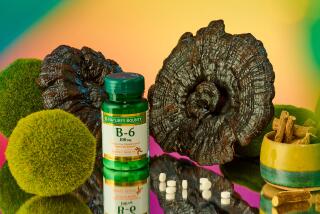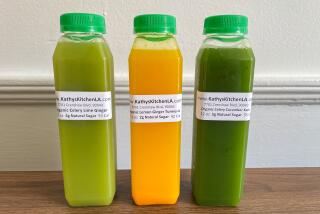When you’re thirsty for more
- Share via
Often billed as “health” drinks, a growing number of specialty beverages offer to quench more than consumers’ thirst.
Drinks such as Naked “Food-Juice” Superfood Green Machine and Red Bull contain a wide range of ingredients -- among them the Brazilian berry acai (pronounced AH-sigh-EE) and taurine, an amino acid.
Some of the drinks promise to boost energy. Others say they can promote immunity or bridge the nutritional gap for those who might not be eating right. And a few drinks are aimed at people who seek a healthier alternative to sugary sodas.
Even beer and malt beverage makers are getting into the act. In January, Anheuser-Busch introduced B(E), a beer infused with caffeine, ginseng and guarana, a jungle vine that produces caffeine-rich yellow fruit (the “e” is for energy). Drinkers of Sparks malt liquor also get caffeine and taurine in their brew.
How much of these added ingredients the drinks deliver varies widely. In many cases, “the amount is usually going to be pretty negligible,” says Leslie Bonci, director of sports nutrition at the University of Pittsburgh Medical Center. “Otherwise you’d be paying a ton, and it probably wouldn’t taste that good.” Even so, the drinks can take a bite out of your wallet, often running more than $3 per can or bottle.
And their calorie content often rivals or exceeds that of soft drinks. A 15-ounce bottle of Odwalla’s Berries GoMega has 320 calories. Naked Food-Juice Superfood Green Machine packs 260 calories per 15-ounce bottle. Even Think, an Enhanced Water Beverage, has 125 per 20-ounce bottle. “Calorie-wise, you’re not saving anything with these drinks,” says Bonci, who serves as a nutritional consultant to the Pittsburgh Steelers. “You could eat a big salad for a lot fewer calories and won’t be as hungry as a result.”
Here’s a brief rundown of some of the ingredients now included in specialty drinks:
* Acai. Commercial purveyors of drinks with these palm berries say they contain high levels of antioxidants and other ingredients that could have wide-ranging health benefits. But Germany’s Commission E, which reviews the effectiveness of herbal medicines, is silent on this ingredient. The National Institutes of Health’s Office of Dietary Supplements lists two studies on acai, neither of which look at health effects.
* Ginkgo biloba. This tree extract has been approved in Germany to treat a type of dementia. Some studies hint at possible heart benefits for ginkgo, which appears to have some estrogen-like activity. No definitive answers yet.
* Ginseng. Commission E and the World Health Organization say this root herb can help combat fatigue and improve concentration. Those with hypertension are advised not to use it because it can raise blood pressure.
* Green tea. This popular beverage can help boost metabolism a little and is known to contain antioxidants that may help protect against cancer.
* Guarana. Rich in caffeine, theobromine and theophylline, guarana is a powerful stimulant. Whether it works for fatigue hasn’t been proved, according to Physicians Desk Reference for Herbal Medicines. The PDR lists one gram as the daily dosage -- about the amount found in two and a half 16.5-ounce cans of Rock Star. One study in rats found that guarana protects the stomach against alcohol damage. No similar research has been done in humans.
* Milk thistle. Commission E and the U.S. Agency for Healthcare Research and Quality say milk thistle may help repair liver disease and cirrhosis. Side effects may include nausea, diarrhea, flatulence, headache and abdominal fullness or pain.
* Omega-3 fatty acids. These healthy fats are good for your brain, heart and joints. A 15-ounce bottle of Odwalla’s Berries GoMega delivers 1,300 milligrams of alpha-linolenic acid, enough to slightly exceed the daily adequate intake (AI) for women set by the National Academy of Sciences and nearly meet the AI for men. But that’s just one type of omega-3. Two servings of seafood per week usually meet all omega-3 needs.
* Spirulina. This edible algae is rich in protein as well as vitamins A, D, K and B12. Some studies hint at cancer protection. But skip it if you have any autoimmune disorders. A recent report in the Archives of Dermatology linked spirulina to development and flare-ups of a rare autoimmune disease that produces painful body sores.
* Taurine. Studies of supplementation of the amino acid taurine have been mostly limited to animals. For now, the evidence of any health benefits is uncertain.
More to Read
Eat your way across L.A.
Get our weekly Tasting Notes newsletter for reviews, news and more.
You may occasionally receive promotional content from the Los Angeles Times.









